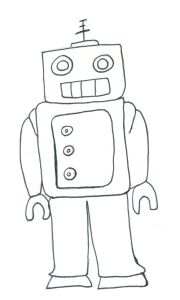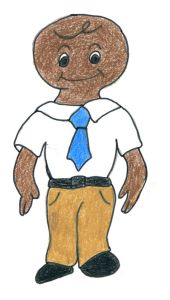Meet Gerald – Our Self-Regulation Guy (Impulse Readiness & Control)
“Hi, my name is Gerald. You have already met some of my friends, Henry, George, Larry & Gary, and Sally. You haven’t met Samantha, Thomas or Amanda yet. I am so lucky to have such good friends.
I am a cub scout and cannot wait until I am old enough to be a boy scout. Every summer, my scout troop goes on camping trips to hike and fish. I like hiking better than fishing. I love setting up the tent at our campsite and helping with fire safety. I also like making the car for the pinewood derby race and last year, I came in second place. The race is always so much fun.
I have  a job delivering newspapers. I love reading the newspaper, especially the comics. I try to do the crossword puzzles, but usually need Amanda’s help.
a job delivering newspapers. I love reading the newspaper, especially the comics. I try to do the crossword puzzles, but usually need Amanda’s help.
I do karate with Thomas every week and just got my orange belt. I love playing flashlight tag with Larry & Gary, but the most fun game is Simon Says that I play with all of my friends.
Samantha and I collect butterflies and my favorite is the monarch. I love the orange and black together. It reminds me of Halloween. I am thinking of being a robot this year.
I need to get ready. I am playing golf with Sally this afternoon. Sometimes we play with Thomas, but he cannot play today. We are taking George and teaching him. He has never played, but I bet he will become an excellent player. He is so good at sports.
Well, I’ve got to go now. Have a nice day.”
Self-Regulation: Layman’s Terms
Self-regulation, for our purposes, involves our ability to control our impulses or call upon them to generate a response to something in our environment. Our children’s ability of impulse control predicts school readiness, academic achievement, social competence and appropriate conduct. Deficits in self-regulation are part of the definition of ADHD.
Environment, genetics, and temperament all play a part in our ability for self-regulation, specifically the impulse readiness and control aspects of self-regulation.
The environment matters as self-regulation takes years to develop as children steadily gather self-control abilities from birth through adolescence. Positive parenting through security attachment, encouraged independence, emotional dialogue, and positive guidance help children gain self-control skills. Conversely, negative parenting adversely affects a child’s self-regulation ability. Other environmental factors involve available physical & social resources, prenatal care, and structured environments.
Genetics plays a part in a child’s self-regulation ability. There are DAT1 genes that impact our level of dopamine, a brain chemical that influences the areas of the brain affecting our ability to self-regulate. There are different versions of these genes called alleles, a long one and a short one. The long version indicates better self-control than the short one. There is another gene, DRD4, that is associated with a higher risk of ADHD.
Some children are more apt to participate in the unfamiliar while others are not. Temperament is tied to self-regulation and is based in brain development. Children who have more activity in the left frontal area of their brain are more eager to explore the unfamiliar. While children with more activity in the right frontal area tend to avoid the unfamiliar.
Self-regulation is complex as it involves genetics, temperament and environment. There is a positive aspect of this complexity as parents can directly impact a child’s ability at self-regulation by changing his or her environment.
Some Sciency-Stuff
There are three areas of the brain that are primarily involved with impulse readiness and control. These are:
The pre-frontal cortex controls rules, reasoning, suppressing impulses and making decisions.
Orbitofrontal cortex is involved with decision-making, particularly that involving reward.
Anterior Cingulate is the powerhouse that receives messages from many area of the brain, integrates them and balances emotional feelings with logical thinking. The top part develops during ages 3 – 6 years and leads to greater impulse control.
The brain gets more efficient in exerting self-regulation as we get older.
Reference material: “Self Control & the Developing Brain” by Amanda Tarullo, Jelena Obradovic and Megan Gunnar, 2009.


